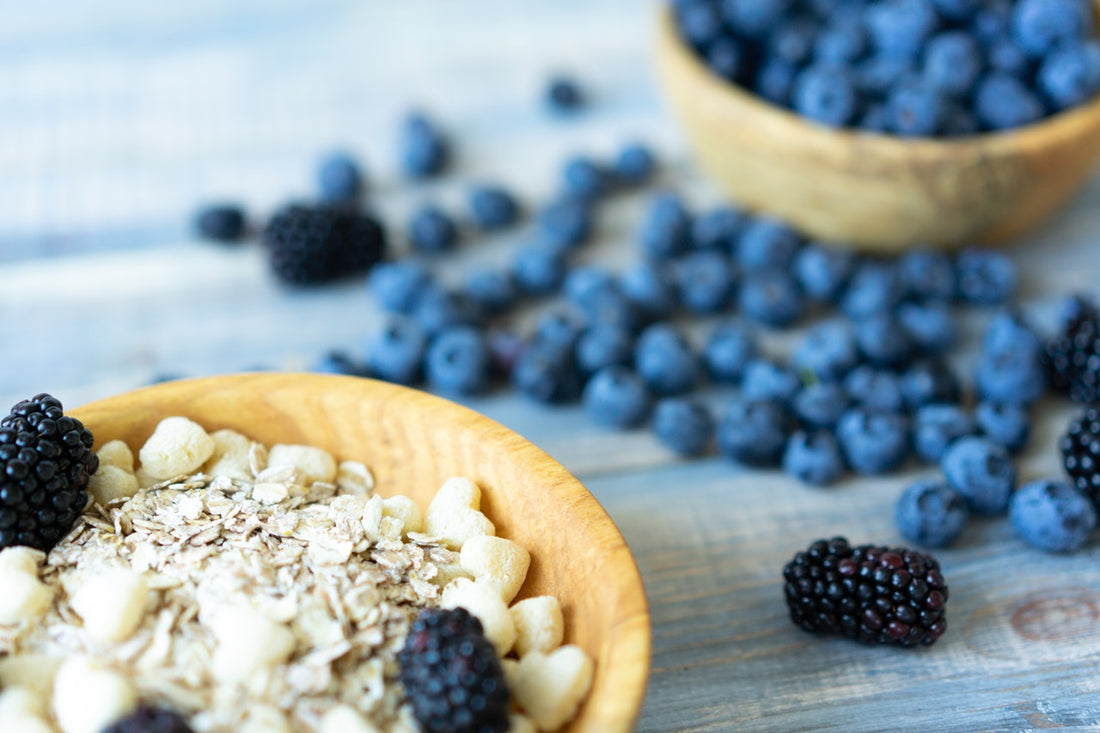When it comes to skincare, there are certain buzzwords that are thrown around all the time, like paraben-free, sulfate-free, clean, and organic. One of those buzzwords? Polyphenols.
Now, chances are that you know polyphenols - a type of antioxidants - are a good thing, and they can help with anti-aging and an overall youthful glow. But you may not know much more than that - and you should understand what you’re putting on your face.
Let’s clarify.
Polyphenols: The Basics
Polyphenols are a group of compounds naturally found in various plant foods, including fruits, vegetables, herbs, spices, tea, dark chocolate, and wine. They’re famously high in green tea, but they can also be found in highest concentrations in:
- Cocoa powder
- Mexican oregano
- Cloves
- Dark chocolate
- Black chokecherry
- Flaxseed meal (though you can check out the 100 richest sources of polyphenols here).

Like with anything, though, remember that the concentration of polyphenols in certain plants or products doesn’t just have to do with the plant itself. It also has to do with the origin, the ripeness, and how the plant was transported, stored, and prepared.
So remember, if you want high quantities of polyphenols, look for local, farm-to-table products (or as close as you can find).
Types of Polyphenols
Now, this still doesn’t answer questions like what are polyphenols? And why should I care?
Let's discuss the what first. There are more than 8000 known polyphenols, which is a lot to keep track of. To simplify things, they can generally be classified into four main groups:
- Flavonoids: About 60% of polyphenols are flavonoids. These are pigments responsible for the vivid color in many fruits and vegetables, and they include compounds - like quercetin, kaempferol, and catechins - that are found in things like apples, dark chocolate, and red cabbage. Among other things, flavonoids have been associated with increased longevity, decreased inflammation, weight loss, and fewer incidents of cardiovascular disease.
- Phenolic acids: About 30% of polyphenols are phenolic acids, and they can be found primarily in fruits, whole grains, and seeds. These, too, have antioxidant and anti-inflammatory properties.
- Polyphenolic amides: This category includes capsaicinoids in chili peppers and avenanthramides in oats. Capsaicinoids such as capsaicin are responsible for the hotness of chili peppers but have also been found to have strong antioxidant and anti-inflammatory properties.
- Other polyphenols: These include things like resveratrol (usually found in red wine), curcumin (found in turmeric) and ellagic acid (found in berries).
The Benefits
Now, the why - though increased longevity, less inflammation, and decreased inflammation of disease already sounds pretty compelling already.
As we mentioned, these various forms of polyphenols can act as powerful antioxidants, meaning that they can protect the skin and the body against free radical damage and the five most common environmental toxins (pesticide, smoking, mycotoxin, polychlorinated biphenyls, and arsenic). They act as fruit extracts for skin an provide protection. This reduces the risk of wrinkles, skin damage, cancer, heart disease, diabetes, and more - win!
They’re also anti-inflammatory - and long-term, unchecked inflammation is a huge contributing factor to many chronic illnesses, including cancers, autoimmune disorders, and infectious diseases.
Finally, regularly consuming polyphenols is thought to:
- Boost digestion by promoting the growth of beneficial gut bacteria - and curbing the growth of the bad
- Improve brain health by improving memory and improving attention
- Protect against heart disease by reducing chronic inflammation and improving overall cholesterol
- Lower blood sugar levels and reduce the risk of developing type 2 diabetes.
- Reduce the risk of blood clots by reducing excessive platelet aggregation
- Lower risk of cancer through anti-inflammatory and antioxidant effects.
And we haven’t even gotten into the skincare side of things.
Polyphenols and Your Skin
When it comes particularly to skincare, it’s first important to note that polyphenols fit into the larger category of skin antioxidants. These also include:
- L-ascorbic acid
- Vitamin E (tocopherol)
- Vitamin C
- Vitamin A (retinol)
- Polyphenols
- Glutathione
- Coenzyme 10
- Melanin
- Lipoic acid
So what skin concerns can polyphenols help with, and what benefits do they provide?
Benefits on the Skin
So here’s the thing: polyphenols exist in plants - at least in part - to help protect them from the strong UV damage of the sun. They provide the same kind of protection for your face.
Specifically, since polyphenols are known to scavenge free radicals, they can:
- Reduce irritation and inflammation in the skin
- Accelerate wound healing
- Protect the skin from cancer and other forms of skin damage
- Reverse signs of aging, including sun spots, fine lines, and wrinkles
- Provide sun protection
This makes products with polyphenols great choices for those with sensitive skin, rosacea, or eczema.
Find It In

Green tea (often listed as Camellia sinesis) is one of our go-to polyphenol ingredients! You can find it in:
- The Pep Rally day serum that combines green tea with hyaluronic acid and vitamin C to moisturize the skin, minimize pores and brighten skin’s appearance.
- No Plans antioxidant face mask that gently purifies and detoxifies the skin - without overdrying - using kaolin clay and rose flower.
- Daydreamer moisturizer, which uses hyaluronic acid, vitamin E, and antioxidants to effectively hydrate the skin and restore its natural barrier function.
- All In eye cream, which combines hyaluronic acid, vitamin C, and peptides to boost collagen production, smooth wrinkles, and reduce puffy, dark eyes.
Not sure how to fit polyphenols into your beauty routine? We recommend that you use at least one product daily - whether it’s a serum, cleanser, or moisturizer - that adds this antioxidant element to your skin. That way, you won’t have to deal with nasty damage from the sun, smoke, and other pollutants - yay!


